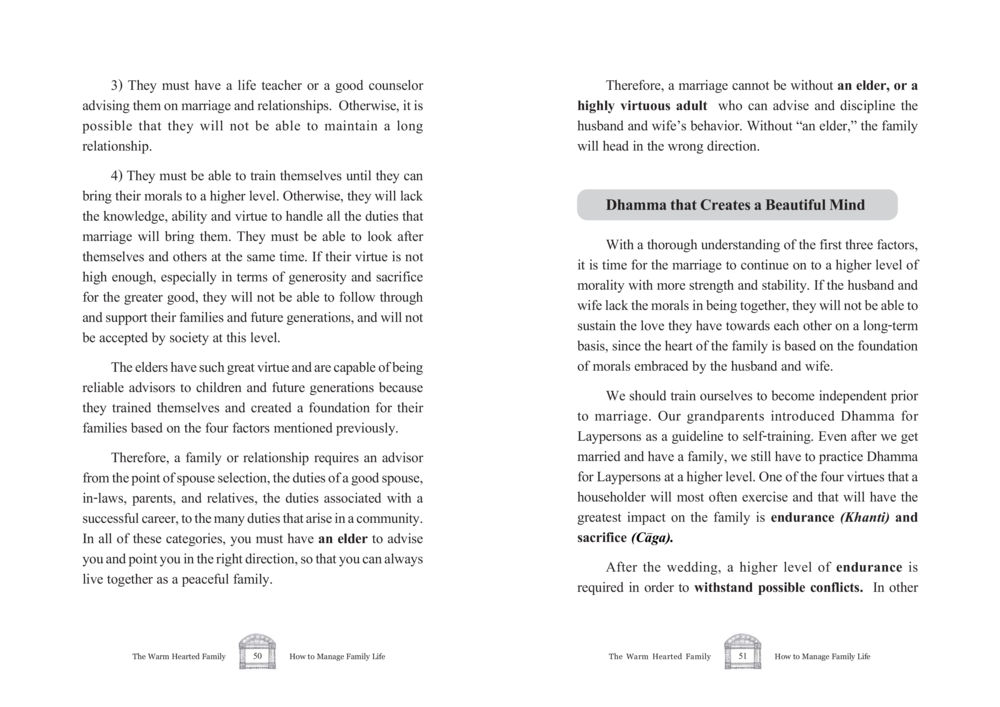The Importance of Elders in Marriage and Family Life : หน้า 26/207
The Warm Hearted Family : หน้า 26/207 Understanding the role of elders in guiding marriage and family through virtue and moral training.
0 ครั้ง

สรุปเนื้อหา
In marriage, the guidance of elders is vital for sustaining a long-term relationship. They provide necessary advice on spouse selection and morality, ensuring a foundation for a peaceful family life. Training oneself in virtues like endurance and sacrifice is crucial for handling marital responsibilities and community duties. Without such guidance, families may struggle to maintain harmony and direction. The practice of Dhamma for Laypersons remains important even after marriage, as it enhances moral strength and stability, critical for enduring challenges together.
หัวข้อประเด็น
- Role of elders in marriage
- Importance of virtue in relationships
- Need for good counseling
- Training oneself for marriage
- Endurance and sacrifice in family life
ข้อความต้นฉบับในหน้า
3) They must have a life teacher or a good counselor
advising them on marriage and relationships. Otherwise, it is
possible that they will not be able to maintain a long
relationship.
4) They must be able to train themselves until they can
bring their morals to a higher level. Otherwise, they will lack
the knowledge, ability and virtue to handle all the duties that
marriage will bring them. They must be able to look after
themselves and others at the same time. If their virtue is not
high enough, especially in terms of generosity and sacrifice
for the greater good, they will not be able to follow through
and support their families and future generations, and will not
be accepted by society at this level.
The elders have such great virtue and are capable of being
reliable advisors to children and future generations because
they trained themselves and created a foundation for their
families based on the four factors mentioned previously.
Therefore, a family or relationship requires an advisor
from the point of spouse selection, the duties of a good spouse,
in-laws, parents, and relatives, the duties associated with a
successful career, to the many duties that arise in a community.
In all of these categories, you must have an elder to advise
you and point you in the right direction, so that you can always
live together as a peaceful family.
Therefore, a marriage cannot be without an elder, or a
highly virtuous adult who can advise and discipline the
husband and wife's behavior. Without "an elder," the family
will head in the wrong direction.
Dhamma that Creates a Beautiful Mind
With a thorough understanding of the first three factors,
it is time for the marriage to continue on to a higher level of
morality with more strength and stability. If the husband and
wife lack the morals in being together, they will not be able to
sustain the love they have towards each other on a long-term
basis, since the heart of the family is based on the foundation
of morals embraced by the husband and wife.
We should train ourselves to become independent prior
to marriage. Our grandparents introduced Dhamma for
Laypersons as a guideline to self-training. Even after we get
married and have a family, we still have to practice Dhamma
for Laypersons at a higher level. One of the four virtues that a
householder will most often exercise and that will have the
greatest impact on the family is endurance (Khanti) and
sacrifice (Caga).
After the wedding, a higher level of endurance is
required in order to withstand possible conflicts. In other
The Warm Hearted Family
50
How to Manage Family Life
The Warm Hearted Family
51
How to Manage Family Life
หน้าหนังสือทั้งหมด

1

2

3

4

5

6

7

8

9

10

11

12

13

14

15

16

17

18

19

20

21

22

23

24

25

26

27

28

29

30

31

32

33

34

35

36

37

38

39

40

41

42

43

44

45

46

47

48

49

50

51

52

53

54

55

56

57

58

59

60

61

62

63

64

65

66

67

68

69

70

71

72

73

74

75

76

77

78

79

80

81

82

83

84

85

86

87

88

89

90

91

92

93

94

95

96

97

98

99

100

101

102

103

104

105

106

107

108

109

110

111

112

113

114

115

116

117

118

119

120

121

122

123

124

125

126

127

128

129

130

131

132

133

134

135

136

137

138

139

140

141

142

143

144

145

146

147

148

149

150

151

152

153

154

155

156

157

158

159

160

161

162

163

164

165

166

167

168

169

170

171

172

173

174

175

176

177

178

179

180

181

182

183

184

185

186

187

188

189

190

191

192

193

194

195

196

197

198

199

200

201

202

203

204

205

206

207
หนังสือที่เกี่ยวข้อง
Load More
